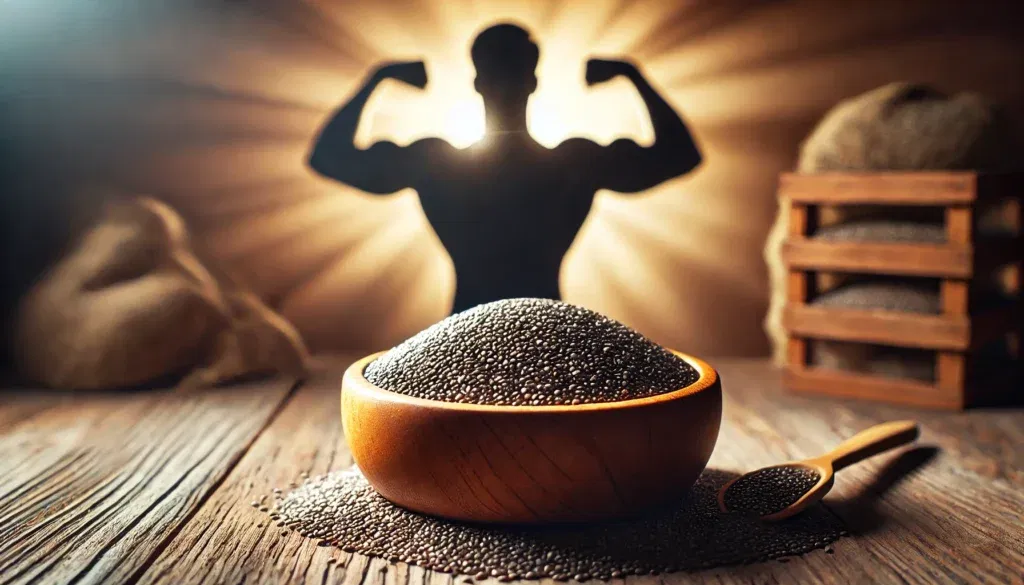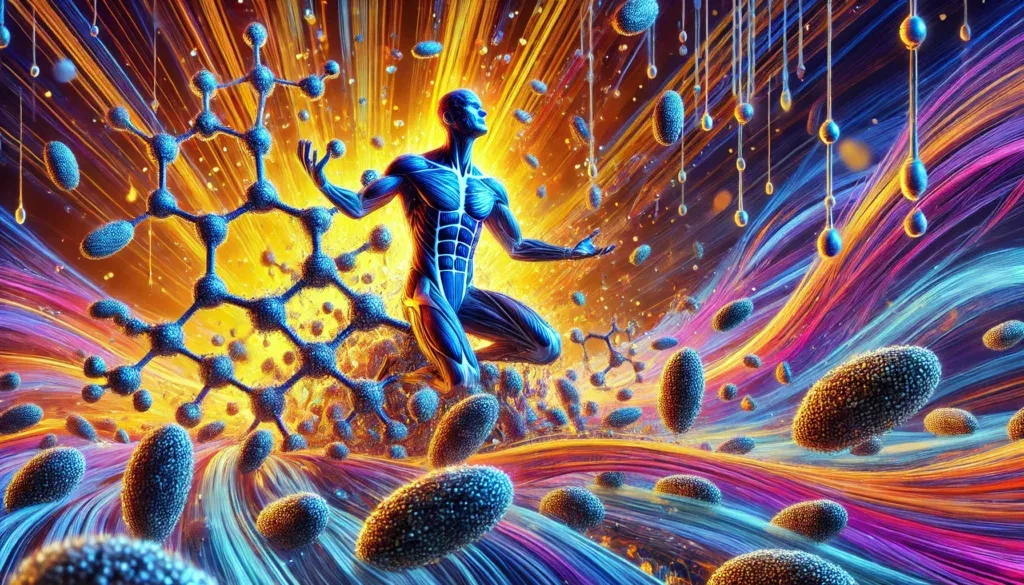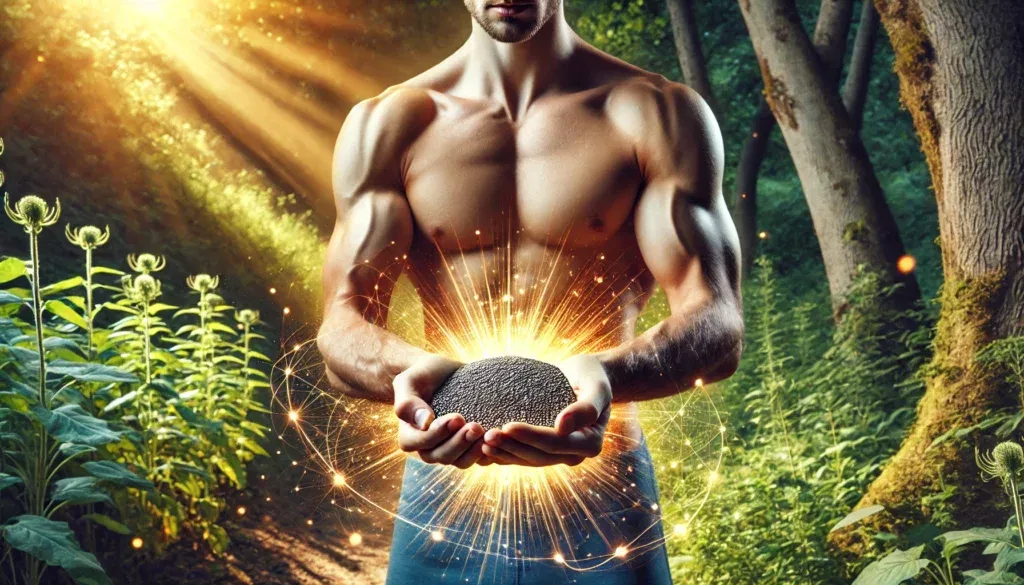Understanding Testosterone and Its Role in Men’s Health
Testosterone is a crucial hormone in the male body, influencing numerous physiological functions. It plays a key role in muscle mass development, bone density maintenance, and fat distribution. Additionally, it significantly impacts libido, mood regulation, and overall energy levels. As men age, testosterone levels naturally decline, leading to potential symptoms such as reduced muscle strength, increased body fat, and lower sexual performance.
You may also like: How to Increase Testosterone Levels Naturally: Science-Backed Strategies for Men’s Health & Longevity
Dietary choices have been found to play a substantial role in regulating testosterone levels. Certain nutrients are essential for maintaining optimal hormone production, while others may negatively impact testosterone balance. Among the many natural foods studied for their effects on testosterone, chia seeds have gained attention due to their impressive nutritional profile. These tiny seeds, packed with omega-3 fatty acids, fiber, protein, and essential minerals, may provide significant benefits in supporting healthy testosterone levels.

The Nutritional Profile of Chia Seeds
Chia seeds are an ancient superfood, once a staple in the diets of the Aztecs and Mayans. They are celebrated for their dense nutrient composition, making them a powerful addition to any diet. A single serving of chia seeds, approximately two tablespoons, contains high levels of omega-3 fatty acids, plant-based protein, dietary fiber, antioxidants, and various micronutrients essential for overall health.
One of the most significant components of chia seeds is their omega-3 fatty acid content, primarily in the form of alpha-linolenic acid (ALA). Omega-3 fatty acids are known to support cardiovascular health, reduce inflammation, and play a role in hormone production. Additionally, chia seeds are rich in magnesium, zinc, and calcium, minerals that contribute to testosterone production and overall endocrine function. Their high fiber content promotes digestive health, while antioxidants help combat oxidative stress, which can negatively affect hormone balance.
The Relationship Between Chia Seeds and Testosterone Production
One of the primary reasons chia seeds are believed to support testosterone levels is their rich content of essential nutrients directly involved in hormone synthesis. Omega-3 fatty acids, in particular, are crucial for cellular function and hormone production. Research has shown that diets high in healthy fats, especially omega-3s, can help support optimal testosterone levels.
Zinc and magnesium, two minerals found in chia seeds, are also vital for testosterone production. Zinc plays a role in the conversion of cholesterol into testosterone, a key step in hormone synthesis. Studies have shown that zinc deficiency can lead to lower testosterone levels and impaired reproductive function. Magnesium, on the other hand, aids in muscle function, improves sleep quality, and has been linked to higher free testosterone levels in men. Since chia seeds are a rich source of both of these minerals, they provide a natural dietary means of supporting testosterone production.
Omega-3 Fatty Acids in Chia Seeds and Their Impact on Hormonal Health
The omega-3 fatty acids found in chia seeds have been widely studied for their impact on overall health, but their role in testosterone production is particularly notable. These essential fats play a role in reducing inflammation, which can be beneficial for maintaining optimal endocrine function. Chronic inflammation has been linked to reduced testosterone levels, as it can interfere with normal hormone signaling.
Omega-3 fatty acids also contribute to improved cardiovascular health, ensuring efficient blood flow, which is necessary for proper nutrient and oxygen delivery to hormone-producing glands. This can enhance testosterone synthesis and overall hormonal balance. While many people associate omega-3s with fish oil, chia seeds provide a plant-based alternative that still offers significant benefits for men’s health.
The Role of Zinc and Magnesium in Testosterone Support
Zinc is one of the most well-researched minerals in relation to testosterone production. It has been shown to have a direct influence on testosterone synthesis by supporting the function of the testes. Men who suffer from zinc deficiency often experience a decline in testosterone levels, which can lead to various health issues, including reduced energy levels, poor muscle recovery, and decreased libido. Chia seeds offer a plant-based source of zinc, making them an excellent addition to a testosterone-supporting diet.
Magnesium also plays a critical role in testosterone regulation. It has been found to increase free testosterone levels by reducing the binding of testosterone to sex hormone-binding globulin (SHBG). When testosterone is bound to SHBG, it becomes inactive and less available for use by the body. By increasing free testosterone levels, magnesium helps to maintain a healthier hormonal balance, which is essential for muscle growth, energy production, and overall well-being.
How Chia Seeds Can Support Overall Hormonal Balance
In addition to supporting testosterone levels, chia seeds contribute to overall hormonal balance in several ways. Their high fiber content promotes healthy digestion, which is essential for the proper metabolism and excretion of excess hormones. An imbalanced gut microbiome can lead to hormone dysregulation, and fiber-rich foods like chia seeds support the growth of beneficial gut bacteria.
Furthermore, the antioxidants in chia seeds help combat oxidative stress, which can negatively impact testosterone production. Oxidative stress occurs when there is an imbalance between free radicals and antioxidants in the body. Excessive oxidative stress can damage cells, including those involved in hormone production. By consuming antioxidant-rich foods like chia seeds, men can support their body’s natural ability to regulate hormones effectively.
Practical Ways to Incorporate Chia Seeds into a Testosterone-Supporting Diet
Adding chia seeds to the diet is simple and can be done in various ways. One of the easiest methods is to sprinkle them over meals such as yogurt, oatmeal, or salads. They can also be blended into smoothies or incorporated into baking recipes. Another popular option is to make chia pudding by soaking the seeds in a liquid such as almond milk, allowing them to absorb moisture and develop a gel-like consistency.
For those focused on optimizing testosterone levels, pairing chia seeds with other testosterone-boosting foods can be beneficial. Foods such as eggs, lean meats, leafy greens, and nuts all provide complementary nutrients that work together to support hormone production. By maintaining a well-rounded diet that includes these elements, men can take proactive steps to enhance their overall hormonal health.

Frequently Asked Questions (FAQ) on Chia Seeds and Testosterone
1. How do chia seeds and testosterone levels interact?
Chia seeds are rich in essential fatty acids, particularly omega-3s, which play a crucial role in hormone production. These healthy fats help regulate cholesterol levels, which are fundamental for synthesizing testosterone. Additionally, chia seeds contain zinc and magnesium, both of which are linked to improved testosterone production. While chia testosterone benefits are not as well-researched as other dietary interventions, some studies suggest that omega-3-rich foods can positively impact hormone balance. However, maintaining a well-rounded diet alongside chia seed consumption is essential for optimal results.
2. Can eating chia seeds daily increase testosterone naturally?
Regular consumption of chia seeds may support testosterone production due to their nutrient composition. The presence of omega-3 fatty acids can reduce inflammation and enhance blood circulation, both of which contribute to improved hormonal function. Additionally, chia seeds provide antioxidants that help mitigate oxidative stress, a factor known to lower testosterone levels. While chia testosterone benefits are promising, they should be combined with other healthy lifestyle habits, such as resistance training and quality sleep, to maximize hormone optimization. It’s also advisable to monitor overall dietary balance rather than relying solely on chia seeds for hormonal benefits.
3. Are there any scientific studies linking chia seeds to testosterone levels?
Currently, direct studies specifically on chia seeds and testosterone levels are limited. However, research on omega-3 fatty acids, which chia seeds are abundant in, has shown positive effects on endocrine health. Omega-3s have been linked to improved Leydig cell function, which is responsible for testosterone synthesis in the testes. Additionally, studies have shown that diets rich in zinc and magnesium can support testosterone production, and chia seeds provide both minerals. Although more targeted research is needed, the nutritional profile of chia seeds suggests they can be beneficial for maintaining hormonal balance.
4. How do chia seeds compare to other testosterone-boosting foods?
Chia seeds stand out due to their rich omega-3 content, fiber, and essential minerals, but they are not the most potent food for increasing testosterone. Foods such as oysters, eggs, and lean meats have higher concentrations of direct testosterone-supporting nutrients like zinc and vitamin D. However, chia testosterone benefits may be more significant when incorporated into a comprehensive diet rather than as a singular focus. Combining chia seeds with other nutrient-dense foods that support hormone health can create a well-rounded approach to testosterone optimization.
5. Do chia seeds have any negative effects on testosterone levels?
There is no evidence suggesting that chia seeds negatively impact testosterone levels. However, excessive consumption of chia seeds without balancing other nutrients could lead to an overabundance of certain fats, potentially affecting hormone levels indirectly. Since testosterone production relies on a variety of dietary components, relying solely on chia seeds for hormonal health is not recommended. Instead, chia seeds should be integrated into a diverse diet that includes proteins, healthy fats, and vitamins essential for testosterone synthesis. Moderation and variety remain key principles in dietary planning for optimal hormone balance.
6. How should chia seeds be consumed for the best testosterone-boosting benefits?
To maximize the benefits of chia seeds and testosterone levels, they can be added to various meals. Soaking chia seeds in water or milk before consumption enhances digestibility, allowing the body to absorb nutrients more efficiently. They can be mixed into smoothies, yogurt, oatmeal, or sprinkled over salads for added nutritional value. Pairing chia seeds with other testosterone-supporting foods like eggs, nuts, and lean meats can further enhance their effects. Since chia testosterone benefits stem from their rich nutritional profile, consistency in consumption is necessary for noticeable results.
7. Do chia seeds help with muscle growth in addition to testosterone production?
Chia seeds are a great source of plant-based protein and essential amino acids, which support muscle repair and growth. While they do not provide as much protein as animal-based sources, they contribute to overall muscle-building nutrition. The presence of omega-3 fatty acids in chia seeds helps reduce inflammation and improve recovery time, indirectly supporting muscle growth. Additionally, the fiber content in chia seeds aids digestion and nutrient absorption, which is crucial for protein synthesis. Therefore, incorporating chia seeds into a well-structured diet can support both testosterone production and muscle development.
8. Are there any lifestyle factors that enhance the effects of chia seeds on testosterone?
Yes, several lifestyle factors can enhance the impact of chia seeds on testosterone levels. Regular strength training and resistance exercises have been shown to boost testosterone naturally. Adequate sleep and stress management also play a critical role in hormone regulation. Additionally, avoiding processed foods, excessive alcohol, and high sugar intake can prevent testosterone suppression. When combined with these habits, chia testosterone benefits can be more pronounced, leading to overall improved hormonal health.
9. Can chia seeds be used as a natural alternative to testosterone supplements?
While chia seeds contribute to overall hormonal health, they should not be considered a direct replacement for medical testosterone supplementation. Testosterone replacement therapy (TRT) is often recommended for individuals with clinically low levels that diet alone cannot correct. However, chia testosterone benefits can be useful for individuals seeking natural dietary support for hormone maintenance. Before making any changes to hormone therapy, consulting a healthcare professional is highly recommended. A well-balanced diet incorporating chia seeds can complement other approaches to testosterone optimization but should not be relied upon as a standalone solution.
10. How long does it take to see testosterone-related benefits from eating chia seeds?
The timeline for experiencing testosterone-related benefits from chia seeds varies depending on individual health status and lifestyle factors. Since hormone regulation is influenced by multiple variables, changes may take several weeks to months to become noticeable. Consistent consumption of chia seeds, along with other testosterone-supporting habits like exercise and proper sleep, increases the likelihood of results. Monitoring energy levels, mood stability, and muscle strength over time can help assess potential improvements. While chia testosterone benefits are promising, long-term adherence to a holistic lifestyle is essential for sustained hormonal health.

Conclusion: The Science-Backed Benefits of Chia Seeds for Testosterone and Men’s Health
The relationship between chia seeds and testosterone is backed by scientific evidence highlighting their rich nutritional profile and hormone-supporting properties. With their high content of omega-3 fatty acids, zinc, magnesium, and antioxidants, chia seeds provide a natural way to support testosterone production and overall men’s health. Their ability to reduce inflammation, enhance cardiovascular health, and improve hormonal balance makes them a valuable addition to any diet focused on optimizing male vitality.
Incorporating chia seeds into a daily meal plan can be an easy and effective strategy for men looking to support their testosterone levels naturally. Whether consumed in smoothies, sprinkled over meals, or used in creative recipes, these nutrient-dense seeds offer a powerful way to enhance well-being and maintain hormonal balance. As research continues to uncover the many benefits of chia seeds, their role in supporting men’s health remains a compelling and practical approach to improving overall vitality.
chia seeds benefits for men, omega-3 and testosterone, best foods for testosterone, natural testosterone boosters, men’s health superfoods, hormone balance in men, how to increase testosterone naturally, zinc and testosterone, magnesium benefits for men, anti-inflammatory foods for testosterone, best plant-based foods for men’s health, testosterone and diet, superfoods for energy and strength, heart health and testosterone, chia seeds for male fertility, boosting testosterone through nutrition, antioxidants and hormone health, chia seeds and energy levels, plant-based sources of omega-3, testosterone-friendly diet
Further Reading:
6 Foods That Lower Testosterone Levels
Disclaimer: The information provided in this article is for general informational purposes only. The content does not constitute professional advice of any kind, including but not limited to medical, legal, or financial advice. HisHealthMag and its contributors make no representations or warranties regarding the accuracy, completeness, or reliability of the information presented. Always seek the advice of a qualified professional for any specific concerns or questions you may have. Neither HisHealthMag nor its authors assume any responsibility or liability for any actions taken based on the information provided in this article. The views and opinions expressed are those of the author(s) and do not necessarily reflect the official policy or position of HisHealthMag.





